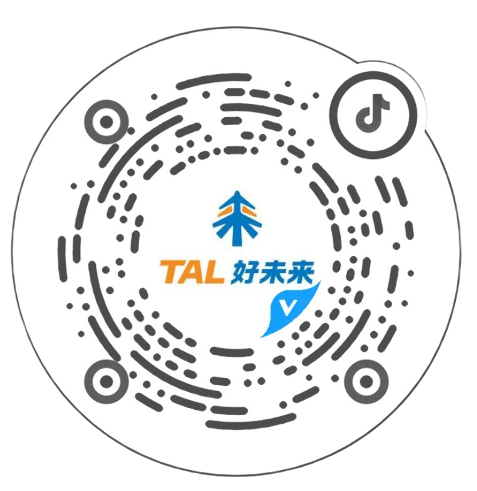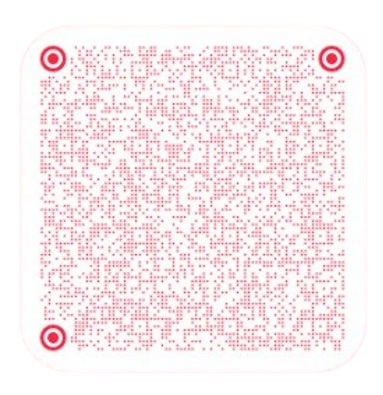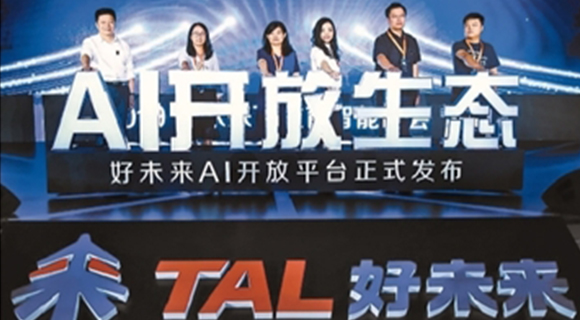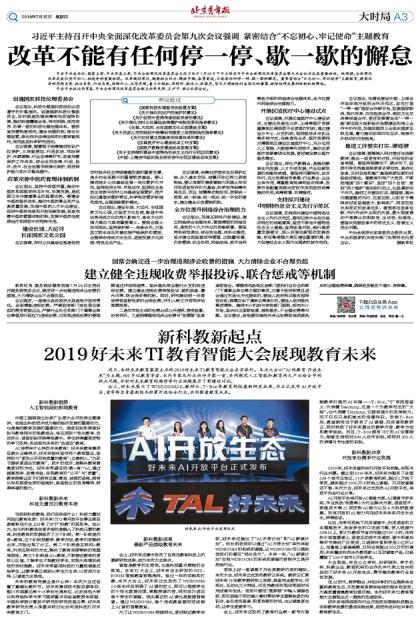





Recently, the 2019 Tomorrow Advancing Life (TAL) Education Intelligence (TI) Conference, organized by TAL Education Group, was held in Beijing. The conference, themed "The Open Future of Education with AI," brought together over 600 education scholars, industry experts, and partners to explore the hot topics in the convergence of artificial intelligence and education, as well as to discuss the future trends in the industry.
During the conference, TAL showcased its latest educational technology research and development achievements, such as WISROOM 2.0, Education Research Cloud, and T-Box, and officially announced the AI open platform, offering its latest technological advances to the entire industry to jointly explore the future of education.
New Trends in Education with New Technologies
The Profound Impact of Artificial Intelligence on Education
Academician of the Chinese Academy of Engineering, Sun Jiaguang, attended the conference and delivered a keynote speech. He pointed out that technological progress is an important driving force for economic and educational development. The combination of speech recognition, image recognition, and educational related scenarios will be applied to personalized education, automatic scoring, and speech recognition evaluation. Students will receive tailored learning support, forming an "adaptive" education towards the future.
What kind of future will AI bring to education? Bai Yunfeng, President of TAL Education Group, stated that TAL has always adhered to two educational concepts: to promote "more equitable and quality education," and to "cultivate students' character." Technological progress is the best way to achieve universal access to quality education. TAL hopes to use (teaching + education) * AI to achieve education that is "equitable" and of "quality" through improved efficiency and enhanced experience. Education can provide children with integrity, kindness, and honesty, and a compass for cognitive exploration of the world, along with independent thinking and the ability to obtain happiness.
The Power of Technology in Education Returning to Its Essence
When talking about technology in education, what are we really discussing? How can the power of technology return to the essence of education? Huang Yan, CTO and President of the Open Platform Business Unit at TAL, shared his thoughts on "sci-ed" at the conference. He believes that today's sci-ed refers to education that integrates technological elements. The development of sci-tech education has gone through three stages: the first stage is content + education, which deconstructs teaching methods and content; the second stage is internet + education, which solves the geographic limitations of educational resources using the internet; and the third stage is AI + education, which aims to understand the students better in order to achieve large-scale individualized teaching. TAL hopes to use the power of technology to return the classroom to students, making teaching genuinely student-centric, teacher-led, and classroom-focused.
What will the future of education look like? The conference also included a summit forum on education. Li Fei, Vice President of Technology at TAL, Zhou Caihong, Principal of Tenth Primary School in Xixia District of Yinchuan, Professor Bi Yanchao from the State Key Laboratory of Cognitive Neuroscience and Learning, Beijing Normal University, Researcher Chen Yunji from the Institute of Computing Technology, Chinese Academy of Sciences, and Li Rui, Head of Teaching and Research at TAL, have all discussed how to use technology to open the door to the future of education.
New Achievements in Cutting-Edge Education
Unveiling the Future of Education with the Latest Products
At the conference, TAL also concentrated on releasing its latest research and development achievements in educational technology, becoming the focus of the conference.
The classroom is not only the main battlefield for teaching but also the main battleground for empowering technology. At last year's TI conference, TAL's independently developed WISROOM intelligent classroom made a stunning appearance. After a year of practice and refining, TAL officially released the 2.0 version of WISROOM at the conference and defined AI courses, which can adjust the course content based on students' personalized data feedback, making the course adaptable to each individual student. Therefore, a truly AI course is characterized by data-driven intelligence. Through WISROOM, every traditional classroom can transform into an intelligent classroom capable of hosting AI courses.
In order to continue evolving WISROOM and better align with actual teaching, TAL has also launched the "AI Angel Plan" and "AI New Course Plan." Principals and teachers can participate in the "AI Angel Plan" to experience the system and courses of WISROOM firsthand, enabling continuous evolution through the feedback of teachers. In the coming year, the "AI New Course Plan" will open up the system and course content production tools of WISROOM to the industry.
Delivering a great lesson depends on quality teaching and research content. At the conference, TAL officially released the Education Research Cloud system. The Education Research Cloud integrates TAL's core teaching and research resources from the past 16 years, offering complete digitization, visualization, and interactivity, supporting teachers in generating courseware in a very short time. Teachers can input the course name in the "search box" and select different media materials to help students understand abstract knowledge points, saving teachers time spent on lesson preparation and resource acquisition, and making the classroom more dynamic, thus fostering a love for learning among students.
At the conference, TAL also announced the release of the first AI terminal designed specifically for intelligent teaching in the education industry—T-Box. "T" has two meanings: it represents "Teaching," a "brain" born for teaching; and it also represents "Thinking," possessing powerful thinking capabilities, not just mechanically transmitting knowledge. With T-Box installed, the classroom gains access to AI courses, dual-teacher classes, and the Education Research Cloud, also obtaining TAL's best teaching content, methods, and teaching experience. Moreover, T-Box has 16T of AI computing power, capable of supporting simultaneous recognition of actions by 800 individuals or recognizing the facial expressions and attention levels of 200 individuals at the same time.
New Shared Vision in Cutting-Edge Education
Open Platform for Industry Collaboration
In 2018, TAL announced the implementation of an open platform strategy to achieve win-win cooperation with the industry. By the end of 2018, TAL had served 1,107 educational institutions in 234 cities and regions across the country, with over 20,000 offline students and over 10 million hours of online courses provided. Simply opening up courses is not enough – at this conference, TAL officially launched the AI open platform, sharing its technology with the entire industry.
The AI open platform will provide three major industry solutions: AI classroom solutions, AI classroom monitoring systems, and homework correction/search solutions, as well as 21 customized AI capabilities such as speech and image technologies and four major scientific research datasets. All open AI capabilities will be continuously optimized and validated within the TAL system.
For example, in TAL's offline dual-teacher classes, speech and text understanding technology is used to grade students' oral practice questions, resulting in productivity gains of more than 20% and saving teachers over 50,000 hours. In large live online classes, the speech interaction technology has been widely used to facilitate over 300 million oral assessments, and during peak summer classes, it is used for over 2 million calls per day. TAL's AI interactive classroom products, Future Magic School and Happy ABC English, have already covered 129 cities and 60,000 students.
During the conference, representatives from public schools, research institutes, academic organizations, sci-ed companies, and educational institutions joined forces on stage to launch the TAL AI open ecosystem, cooperating to promote the sound development of the education industry.
In the AI era, the industry trend of cross-border integration and joint creation and sharing will reshape the educational ecosystem, sparking fundamental changes in the supply of educational resources, thus creating opportunities for high-quality, inclusive education. This TI Education Intelligence Conference reflects the accelerating arrival of this trend.
TAL will continue to open cutting-edge intelligent technology practices in actual teaching scenarios to the industry, promoting the creation of a shared educational ecosystem.
